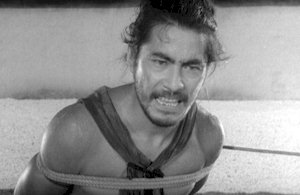|
|
|
|
|
|
|
|
Rashomon |
|
|
|
Year: |
1950 |

Toshiro Mifune |
|
|
Director: |
Akira Kurosawa |
|
|
Producer: |
Minoru Jingo |
|
|
Cast: |
Toshirô Mifune, Machiko Kyô, Masayuki Mori, Takashi
Shimura, Minoru Chiaki, Kichijiro Ueda, Fumiko Honma |
|
|
The Skinny: |
The story of a brutal crime is told from four different points
of view. Which one is the truth? |
|
|
Review
by
Magicvoice: |
Rashomon opens with
a woodcutter (Takashi Shimura) and a Priest (Minoru Chiaki)
sheltering themselves from the rain under the gates of Kyoto's
"Rashomon." Once the grandest of the city's entrances,
the gate is now a haven for wanderers and thieves as well
as dumping ground for corpses. A commoner (Kichijiro Ueda)
joins the group and is soon drawn into their conversation
regarding a brutal crime that they just can't seem to piece
together. This much is certain: a samurai is dead, his wife
was raped and a bandit named Tajomaru (played with great
zeal by Kurosawa regular Toshiro Mifune) has been captured
as a suspect. At this point Rashomon becomes a series
of flashbacks within flashbacks, where we learn what happened
through the different retellings of the four people involved.
Oddly enough, it never gets confusing, even when it's the
dead Samurai's turn to talk. In fact, the film gets more
and more interesting as each person's point of view describes
the crime in a completely different way.
The only thing that all four
people agree on is that the wife's rape was less an act
of violence and more a shameful act of her own volition.
By its very definition, rape is a violation and yet each
of the men perceives the wife as a self-serving traitor
with little loyalty to her husband. This attitude towards
sexual assault and women in general may be a little tough
for modern American audiences to swallow, but it doesn't
take away from the overall dramatic effect of the film.
The conclusion is satisfying and uplifting despite all the
darkness that precedes it. It definitely leaves you thinking.
It has been suggested
that if you put ten people in a room and make them watch
Rashomon, they will all come out describing the movie
in a completely different way. It is a brilliant manipulation
of the medium of film accentuated by haunting music and
gorgeous black and white cinematography. It is apparent
that Akira Kurosawa wanted the audience to come to their
own conclusions after having witnessed all four versions
of the crime. If you want to take this concept to the next
level, then stop reading now because nothing in this review
is to be trusted. It's just another perspective. (Magicvoice
2002)
|
|
|
Availability: |
DVD
(USA)
Region 1 NTSC
Criterion
Full Screen (Original Aspect Ratio)
Japanese Language Track
Removable English Subtitles |
|
|
|
 |
|
|
|
image courtesty
of The Criterion Collection
|
|
|
|
|
|
|
|
|
|
|
|
| LoveHKFilm.com
Copyright ©2002-2017 Ross Chen
|
|
|